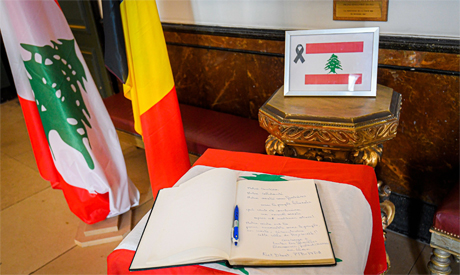
A book of condolence for victims of Beirut blast, is displayed at Brussels city hall, on August 5, 2020, a day after a powerful explosion tore through Lebanon's capital, resulting from the ignition of a huge depot of ammonium nitrate at the city's main port. Photo: AFP
Here is a recap of key events in Lebanon since its independence from France 76 years ago:
Power-sharing
The small Mediterranean country becomes independent on November 22, 1943 after 23 years under French mandate.
A "national pact" lays out a power-sharing agreement between Christians and Muslims that is still in place today.
Civil strife
A five-month civil war breaks out in 1958 when Muslims take up arms against the pro-Western regime.
Lebanon's president Camille Chamoun appeals to the United States for help and Washington sends troops. Successful in suppressing the revolt, they leave after three months.
Palestinians take root
After the Arab defeat in the 1967 Six-Day War, the first Palestinian bases are established in south Lebanon on the border with Israel and Syria.
In 1969, Lebanon legalises the armed Palestinian presence on its soil under the Cairo Accord.
Following the bloody Black September clashes in Jordan in 1970, Yasser Arafat's Palestine Liberation Organisation (PLO) retreats to Lebanon.
Civil war
In 1975, a 15-year-long civil war begins with Christian militias battling Palestinians, who are backed by leftists and Muslim forces.
The following year the Syrian army intervenes, with US approval, after an appeal by embattled Christian forces.
In 1982, Israel invades and besieges Beirut. Arafat and 11,000 Palestinian fighters evacuate the capital.
In September that year, a Christian militia massacres at least 1,000 people in the Palestinian camps of Sabra and Shatila in Beirut.
The war ends in 1990. More than 150,000 people were killed in the conflict and 17,000 went missing.
Syrian domination
Syria's military and political presence is cemented in a 1991 treaty between Damascus and Beirut.
Israel maintains its occupation of southern Lebanon, withdrawing only in 2000.
In 2005, Lebanon's former prime minister Rafic Hariri is killed in a bombing attack in Beirut along with 21 others. Those opposed to Syria blame Damascus, which denies any role.
Mass demonstrations lead to all Syrian troops withdrawing from Lebanon the same year, ending a 29-year deployment.
Israel vs Hezbollah
In 2006, a conflict breaks out between Israeli forces and Lebanon's powerful Shiite movement Hezbollah, founded in 1982 during the civil war.
The unrest is sparked by Hezbollah's capture of two Israeli soldiers from the southern Lebanon border area.
The devastating 34-day war costs Lebanon around 1,200 lives, mostly civilians.
Syria war
In 2013, two years after the start of Syria's civil war, Hezbollah says it has intervened in support of the Damascus government.
Syria's conflict entrenches Lebanon's divided political blocs.
Anti-regime unrest
In 2019 protests break out, sparked by a government plan to tax online phone calls made via apps.
The unrest turns into a nationwide revolt involving hundreds of thousands of people, cutting across sectarian lines, against the perceived ineptitude and corruption of the ruling class.
In April 2020, Lebanon, which has defaulted on its debt, adopts a plan to relaunch the economy, but negotiations stall with the International Monetary Fund.
Deadly explosion
On August 4, two explosions at Beirut's port devastate entire city neighbourhoods, killing more than 100 people, wounding thousands and leaving hundreds of thousands homeless.
The government says the massive blast appears to have been caused by a fire igniting 2,750 tonnes of ammonium nitrate left unsecured in a warehouse.
*This story was edited by Ahram Online.
Short link: